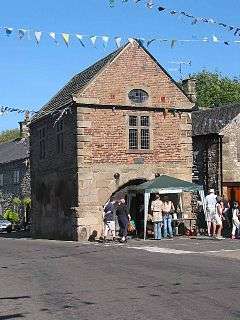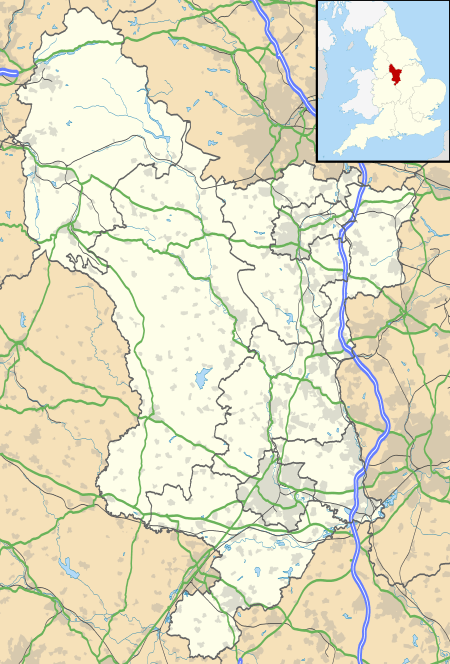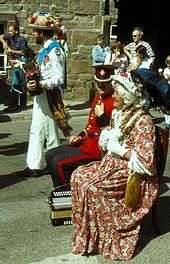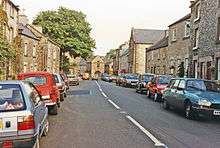Winster
Winster is a village in the English Derbyshire Dales about 5 miles (8 km) from Matlock and 6 miles (10 km) from Bakewell at an altitude of approximately 820 feet (250 m). It was formerly a centre for the lead mining industry. The village, which lies within the Peak District National Park, has a large number of listed buildings, including the Market House open daily as a National Trust information point. Its current population is about 630, though it was 600 at the 2011 Census.[1] The village has a primary school, two churches, two pubs and a village shop (owned by the community) which includes a post office. Winster was mentioned in the Domesday Book in 1086 when it was owned by Henry de Ferrers.[2]
| Winster | |
|---|---|
 The Market House, Winster in 2005 during the village’s Secret Gardens event | |
 Winster Location within Derbyshire | |
| Population | 600 (2011) |
| OS grid reference | SK241605 |
| Civil parish |
|
| District | |
| Shire county | |
| Region | |
| Country | England |
| Sovereign state | United Kingdom |
| Post town | MATLOCK |
| Postcode district | DE4 |
| Dialling code | 01629 |
| Police | Derbyshire |
| Fire | Derbyshire |
| Ambulance | East Midlands |
| UK Parliament | |
A workhouse at Bank Top (grid reference SK239602) was opened in 1744. It had a rule that forbade any relief outside of the workhouse. By the 1770s it could house 40 inmates.[3]
Winster Market House was the National Trust's first property in the Peak District and was acquired in 1906.
Winster Wakes

Winster's parish church is the Church of St John the Baptist, and a week-long annual carnival called Winster Wakes starts on the first Sunday on or after 24 June (the patronal day of St John the Baptist). Main Street is closed briefly on the Sunday for the Wakes Parade, and for much of the following Saturday afternoon, when there are stalls and entertainment (including Morris Dancing) in the street.
Fatal duel
As reported in the Times (London, England) on 2 June 1821, a local surgeon, William Cuddie, was courting Mary, the daughter of the wealthy Brittlebank family of Oddo House in Winster. In May 1821 one of her brothers, William Brittlebank, tried to end their association. On the evening of 21 May Cuddie and Brittlebank quarreled violently. The doctor later received a note:
Sir, I expect satisfaction for the insult you dared to offer me at a time when you knew that my situation with a helpless Woman prevented my chastising you. Name your time and place, the bearer will wait for an answer. Yours William Brittlebank, Junior. I shall be attended by a friend and prepared with pistols, and if you don’t meet I shall post you as a coward.
Cuddie refused to reply to the letter. The following afternoon three of the Brittlebank brothers and a mutual friend, Edmund Spencer, arrived in his garden with two loaded pistols. Cuddie reluctantly accepted one of the weapons. William Brittlebank walked 15 yards (14 m) away, turned and fired. Two shots were heard but only Cuddie was hit. He died a few hours later.
Two of the Brittlebanks (Francis and Andrew) were tried in Derby in August 1821, but were found not guilty of murder, while their brother William, fled with a £100 reward on his head. It is thought that he went to Australia but evidence is lacking.[4][5]

References
- "Civil Parish population 2011". Neighbourhood Statistics. Office for National Statistics. Retrieved 2 April 2016.
- Domesday Book: A Complete Translation. London: Penguin, 2003. ISBN 0-14-143994-7 p.745
- Higginbotham, P. (2007), Workhouses of the Midlands, Tempus, Stroud. Page 26. ISBN 978-0-7524-4488-8
- Small, C 2001, ‘The Brittlebank Murder’, ‘’Winster Local History Group, Newsletter’’, no. 20, May 2001, accessed 17 Jun 2018, url: http://www.winster.org/pages/History/Newsletters/Newsletter20.pdf.
- Lomax, S and Smith, R 2012, 'Doctor dies in duel', Reflections, accessed 18 Jun 2018, url: http://www.reflections-magazine.com.